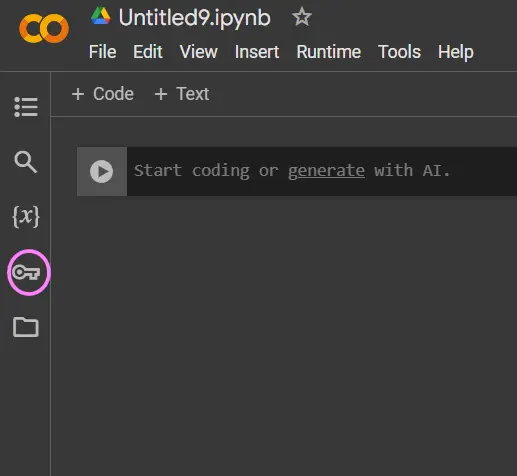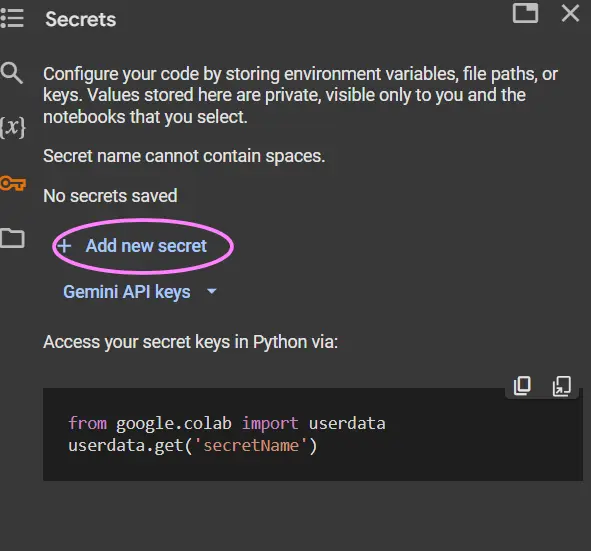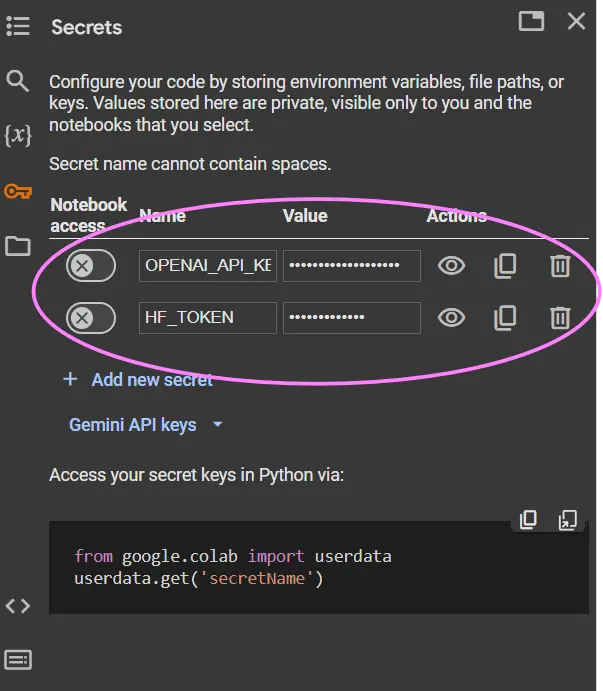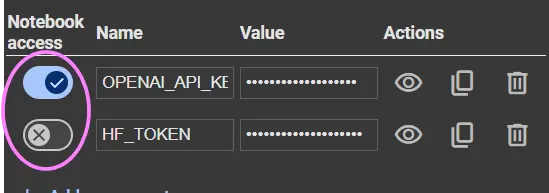Working with APIs in Google Colab is a standard observe for information scientists, researchers, and builders. Nonetheless, dealing with API keys, that are basically passwords granting entry to those providers, requires cautious consideration. Straight embedding API keys in your code or storing them as plain atmosphere variables inside your Colab notebooks poses important safety dangers. Google Colab’s “Secrets and techniques” function presents a strong resolution to this downside, offering a safe and handy option to handle delicate credentials. This complete information delves into the significance of defending API keys, the vulnerabilities of conventional strategies, and an in depth walkthrough of utilizing Colab Secrets and techniques successfully.
Studying Targets
- Learners will be capable of securely retailer API keys and different delicate information utilizing Google Colab’s Secrets and techniques function.
- Learners will be capable of retrieve and make the most of saved secrets and techniques inside their Colab notebooks with out exposing the precise values of their code.
- Learners will be capable of combine secrets and techniques as atmosphere variables to be used with libraries that require this technique of authentication.
- Learners will be capable of apply greatest practices for managing secrets and techniques, together with naming conventions, entry management, and safe updating.
This text was printed as part of the Information Science Blogathon.
Essential Want for API Key Safety
API keys are like digital keys to varied providers, permitting your functions to work together with them. If these keys fall into the flawed fingers, the results might be extreme:
- Unauthorized Entry and Utilization: Malicious actors may use your API keys to entry providers with out your consent, probably incurring sudden prices or exceeding utilization quotas.
- Information Breaches and Safety Compromises: In some instances, compromised API keys may grant entry to delicate information or permit unauthorized modifications to your accounts.
- Reputational Injury: Safety breaches can injury your fame and erode belief amongst customers and stakeholders.
Subsequently, implementing sturdy safety measures to guard API keys is paramount.
Why Use Secrets and techniques?
Storing API keys instantly in your Colab notebooks or as customary atmosphere variables exposes them to a number of vulnerabilities:
- Publicity in Shared Notebooks: For those who share your pocket book with collaborators or publish it publicly, your API keys turn into readily accessible to anybody who views the pocket book.
- Model Management Dangers: Committing notebooks containing API keys to model management programs like Git can inadvertently expose them to the general public, as these repositories are sometimes publicly accessible. Even non-public repositories might be susceptible if entry management shouldn’t be correctly configured.
- Tough Key Rotation: Altering API keys turns into a cumbersome course of if they’re embedded all through your code. You would wish to manually replace each occasion of the important thing, growing the chance of errors and inconsistencies.
Introducing Google Colab Secrets and techniques: A Safe Answer
Google Colab’s Secrets and techniques function addresses these vulnerabilities by offering a safe and centralized option to handle delicate data. Right here’s the way it enhances safety:
- Encrypted Storage: Secrets and techniques are encrypted and saved securely on Google’s servers, defending them from unauthorized entry.
- Granular Entry Management: You may management which notebooks have entry to particular secrets and techniques, guaranteeing that solely approved notebooks can retrieve and use them.
- No Direct Publicity in Code: API keys are by no means instantly embedded in your pocket book code, eliminating the chance of unintended publicity by sharing or model management.
- Simplified Key Rotation: Updating an API key is so simple as modifying the key worth within the Secrets and techniques panel. All notebooks utilizing that secret will robotically use the up to date worth.
Step-by-Step Information to Utilizing Colab Secrets and techniques
Right here’s find out how to use secrets and techniques in Google Colab:
Step1: Entry the Secrets and techniques Function
- Open your Google Colab pocket book.
- Within the left-hand sidebar, you’ll discover an icon that appears like a key. Click on on it to open the “Secrets and techniques” panel.

Step2: Create a New Secret
- Click on on “Add a brand new secret”.

- Give your secret a descriptive title (e.g., “OPENAI_API_KEY”). Notice that the title is everlasting and can’t be modified later.

- Enter the precise API key worth within the “Worth” discipline.
- Click on “Save”.
Step3: Grant Pocket book Entry
- As soon as the key is created, you’ll see a toggle swap subsequent to it.
- Make certain the toggle is enabled to grant the present pocket book entry to the key.

Step4: Use the Secret in Your Pocket book
- To retrieve the key worth in your code, use the next code snippet:
from google.colab import userdata
api_key = userdata.get('OPENAI_API_KEY')

- Substitute ‘OPENAI_API_KEY’ with the precise title of your secret.
- The userdata.get() operate retrieves the key worth as a string. In case your secret is a quantity, you’ll have to convert it accordingly (e.g., int(userdata.get(‘MY_NUMBER’))).
Step5: Utilizing Secrets and techniques as Atmosphere Variables
- Many Python libraries anticipate API keys to be set as atmosphere variables. You may simply obtain this utilizing the os module:

import os
from google.colab import userdata
os.environ["OPENAI_API_KEY"] = userdata.get('OPENAI_API_KEY')
# Now you should utilize the API key with libraries that depend on atmosphere variables # Instance: # import openai
# openai.api_key = os.getenv("OPENAI_API_KEY")
Greatest Practices for Managing Secrets and techniques
Under we’ll look into the very best practices for managing secrets and techniques:
- Significant Secret Names: Use descriptive and constant naming conventions in your secrets and techniques to simply determine and handle them.
- Common Entry Overview: Periodically evaluate which notebooks have entry to your secrets and techniques and revoke entry for notebooks that now not require them.
- Cautious Secret Updates: When updating an API key, replace the corresponding secret worth within the Secrets and techniques panel. Keep away from deleting and recreating secrets and techniques except completely vital.
- Keep away from Printing Secrets and techniques: By no means print or show the precise secret worth in your pocket book output. It is a essential safety precaution.
- Precept of Least Privilege: Grant entry to secrets and techniques solely to the notebooks that completely want them. Keep away from granting broad entry except vital.
Conclusion
Utilizing Google Colab’s Secrets and techniques function is crucial for sustaining the safety of your API keys and different delicate data. By following the rules outlined on this article, you may considerably scale back the chance of unauthorized entry and make sure the integrity of your initiatives. Implementing these greatest practices will contribute to a safer and environment friendly workflow when working with APIs in Google Colab.
Key Takeaways
- Straight embedding API keys in Google Colab notebooks is a major safety danger. Sharing notebooks or committing them to model management can expose these delicate credentials.
- Google Colab’s Secrets and techniques function gives a safe various for storing and managing API keys. Secrets and techniques are encrypted and accessed programmatically, stopping direct publicity in code.
- Secrets and techniques might be simply retrieved inside Colab notebooks utilizing the userdata.get() operate and built-in as atmosphere variables. This enables seamless use with varied libraries and APIs.
- Following greatest practices for secret administration, resembling utilizing descriptive names and often reviewing entry, is essential for sustaining safety. This ensures solely approved notebooks can entry vital credentials.
Often Requested Questions
A. No. Secrets and techniques are saved securely by Google and are usually not included once you share your pocket book. Others might want to create their very own secrets and techniques with the identical names in the event that they wish to run the code.
A. No, the title of a secret can’t be modified after creation. For those who want a distinct title, you’ll must create a brand new secret and delete the outdated one.
A. Merely go to the Secrets and techniques panel, discover the key you wish to replace, and alter the worth within the “Worth” discipline. The change will likely be mirrored in any notebooks that use that secret.
A. Whereas there’s no explicitly documented restrict, creating an extreme variety of secrets and techniques may affect efficiency. It’s greatest to handle your secrets and techniques effectively and keep away from creating pointless ones.
A. No, deleting a pocket book doesn’t delete the related secrets and techniques. You could manually delete secrets and techniques from the Secrets and techniques panel when you now not want them. This is a vital safety function to forestall unintended information loss.
The media proven on this article shouldn’t be owned by Analytics Vidhya and is used on the Creator’s discretion.